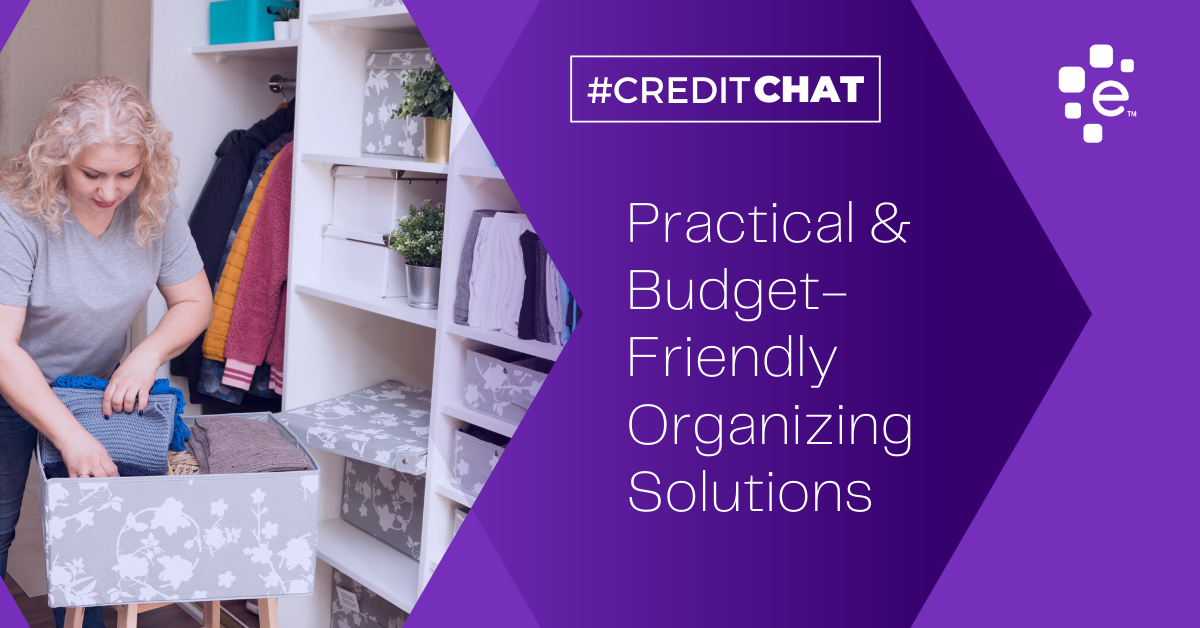Practical & Budget-Friendly Organizing Solutions

Join our #CreditChat on Twitter every Wednesday at 3 p.m. ET.
The panel included Rod Griffin: Senior Director, Consumer Education and Advocacy, Experian; Christina Roman: Consumer Education and Advocacy Manager at Experian; Leslie H. Tayne, Esq: Founder and Managing Director of Tayne Law Group, P.C. (f/k/a The Law Offices of Leslie H. Tayne, P.C.); Beverly Harzog: Credit Card Expert and Consumer Finance Analyst for U.S. News; Lawrence D. Sprung: CFP® President of Mitlin Financial, Inc; Take Charge America; Alexandria White: Credit Cards Reporter at CNBC Select; and Paulina Likos: Investing Reporter at U.S. News.
Questions We Discussed:
Q1: What are the benefits of staying organized?
Q2: How does being organized save you money?
Q3: What are some frugal ways to organize your finances?
Q4: What are some organizing mistakes to avoid?
Q5: What are some budget-friendly storage hacks and solutions for small spaces?
Q6: What are some ordinary items you might already have that can be used for organizing and storage without spending extra money?
Q7: Where can you find inexpensive storage bins, baskets, and containers?
Q8: How often should you declutter?
Q9: What are some simple habits that will help you stay organized?
Q10: Any final tips on organizing without breaking the bank?
A1: Benefits of being organized:
1. Saves you time because you won’t have to look for things.
2. Saves you money because you know what you need—and what you don’t need.
3. Saves your sanity!#CreditChat— Beverly Harzog (@BeverlyHarzog) November 18, 2020
A2: Time is money! Once you’re more organized, you won’t spend so much time trying to find things. You can use that extra time for making more money to pay off your debts or add to your savings. #CreditChat
— Financial Beginnings USA (@finbeg) November 18, 2020
A3. There are some great apps, like Mint, that can help you organize your finances for free. Here are some others to consider as well: https://t.co/xVXfYchgig #CreditChat
— Jennifer White (@Jennifer_Wwhite) November 18, 2020
A4: Don’t go overboard and spend a lot of money on fancy storage bins from expensive, name-brand retailers. You really don’t need $40 totes from pricey furniture stores. #CreditChat pic.twitter.com/DUuhgZ3wN1
— American Consumer Credit Counseling (@ACCC_TalkCents) November 18, 2020
A5. Have a rule that if you are bringing something new to your space, you must get rid of something. This will help you avoid clutter, and if you can sell the item you are getting rid of, even better! #CreditChat
— Christina Roman (@Teena_LaRo) November 18, 2020
A5. Have a rule that if you are bringing something new to your space, you must get rid of something. This will help you avoid clutter, and if you can sell the item you are getting rid of, even better! #CreditChat
— Christina Roman (@Teena_LaRo) November 18, 2020
A7: Watch for sales in craft stores like @MichaelsStores & discount stores like @Target and @Walmart. I love @DollarTree, too! Cheap, colorful containers right here. #CreditChat https://t.co/cTMecR2vfz
— Beverly Harzog (@BeverlyHarzog) November 18, 2020
A7: Watch for sales in craft stores like @MichaelsStores & discount stores like @Target and @Walmart. I love @DollarTree, too! Cheap, colorful containers right here. #CreditChat https://t.co/cTMecR2vfz
— Beverly Harzog (@BeverlyHarzog) November 18, 2020
A9: Opt to pay your bills online rather than getting them in the mail. Not only is that better for the environment, but it cuts down on the amount of paper you have to keep track of and organize. #CreditChat
— American Consumer Credit Counseling (@ACCC_TalkCents) November 18, 2020
A10: You don't have to spend a lot of money to get organized. If you want to keep things frugal, you should avoid trendy storage boxes, systems, and apps that will cost a fortune just for a certain aesthetic when function is what's most important. #creditchat
— Accredited Debt Relief (@Accredited_Debt) November 18, 2020